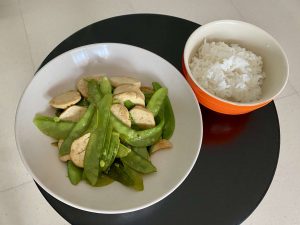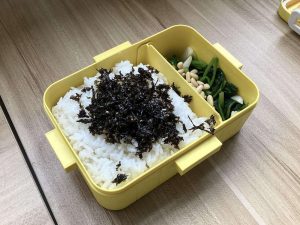//16.2 Youth Space: Green Living
I Survived Going Vegan
by Oscar Cheung
Adopting a vegan diet can significantly reduce our environmental impact, but does it work for busy middle school students like Oscar?
With more people willing to adopt a green lifestyle to combat climate change, students like us may wonder if we can do the same even with a hectic academic lifestyle. Among many approaches, changing what we eat is one crucial way to reduce our environmental impact.
Since the Indus Valley civilisation, a Bronze Age civilisation that flourished in India from around 3300 BCE to 1300 BCE, vegetarians have been abstaining from animal foods for health and animal welfare. In the 21st century, veganism has taken on the definition of avoiding the consumption of animal-derived products, including dairy and eggs.
Nowadays, the vegan diet is more popular than ever. According to the Vegan Society, approximately 3% of the American and European populations follow this lifestyle. As global attention turns toward climate change, many people are ditching animal products to reduce their environmental footprint. This inspired me to try out the vegan diet for a week, aiming to find out whether this strict diet is feasible for students.
But why choose veganism? Livestock farming, especially cattle rearing, is a major contributor to climate change. Compared to crop production, the production of animal protein requires up to 17 times more land and three times more water. Producing a single kilogramme of beef also emits a whopping 100 kilogrammes of greenhouse gases into the atmosphere. By omitting meat from our diets, we cut off financial support for the animal agricultural industry. But is it easier said than done?
And so, the challenge began. Monday was smooth sailing, as my typical school lunch of store-bought vegetable onigiri (Japanese rice balls) contained no animal products! The same went for breakfast and dinner, which were bread and curry rice, respectively – both coincidentally vegan.
The next day, however, things began to go awry. During my morning commute, I inadvertently drank a pack of soy milk that contained “milk solids.” Needless to say, I vowed to thoroughly check every ingredient list for the rest of the week. This slip-up was far from the largest of my troubles, though. To my horror, there was a dire lack of restaurants and shops offering vegan lunch options near my school, so my frantic scurrying during lunchtime was in vain. I ended up starving for the rest of the school day.
On Wednesday, I had to do something I had never done before: I packed a lunch box for myself. My classmates quickly pointed out the stark contrast between our meals: “That looks way too healthy. Are you on a diet?” to which I replied, “Yes.” It was difficult to suppress my envy as I watched my friends chow down on their spaghetti and pizza, but at least I was proud of my efforts.
Due to a lack of culinary choices, I found myself relying on home-cooked meals for the rest of the week, and I am by no means a good chef. The bland meals I put together in the kitchen left me desperate to end the challenge, and by the end of the week, I was craving protein from something other than soy.
On the weekend, I visited a yakiniku restaurant to quell my cravings. But I was not there for ordinary barbecued beef – this particular eatery offered a set meal with plant-based short ribs and skirt steaks. To my disbelief, the cuts were surprisingly meaty and succulent, and I would not have recognised them as vegan had I not been the one who ordered the set. The meal gave me a much-needed boost of willpower to complete the seven-day vegan trial.
With that, the experiment finally came to an end. What are my findings? Long story short, I survived. However, the week was far from a success. The most glaring issue was that switching to a vegan lifestyle takes much more than seven days to adjust to. Throughout the week, I generally felt lethargic and found it difficult to stay focused at school. Besides, many of my favourite comfort foods, such as ice cream and pizza, were off-limits. This contributed greatly to my general moodiness and frustration.
I also struggled with finding vegan food options. There was a lack of places offering vegan meals near school, and many products I thought were vegan contained animal products. Unless you plan on going the extra mile by bringing lunch boxes, have extensive knowledge of all the vegan spots in town, or have the patience to read all the labels on food packaging, I do not see this diet as sustainable in the long run.
Nevertheless, a vegan lifestyle also has its perks. I found myself consuming more fresh fruits and vegetables, which provided plenty of vitamins and dietary fibre. As a picky eater, I was also pushed out of my comfort zone to try foods I would never have eaten otherwise: multiple types of mushrooms, chickpeas, and oat milk, the last of which turned out to be a favourite and is now a regular pantry staple.
Most importantly, the environmental impact of a vegan diet is much smaller. I visited the Government’s Carbon Neutrality and Sustainable Development website, where you can find a handy “Low Carbon Living Calculator.” The calculator reveals that vegetarians emit 1.4 tonnes of carbon dioxide equivalent (including greenhouse gases) annually, which is 30% less than the average emissions of the typical Hong Kong diet.
Although it is evident that veganism is more environmentally friendly than a regular diet, there are alternatives to such a radical diet change. You could try a vegetarian diet, which does not prohibit animal-derived products, or simply go for a plant-based diet and consume meat sparingly. Choosing local and seasonal produce, minimising food waste, and buying minimally packaged and processed foods are also essential for sustainability.
The US National Institutes of Health estimates that the global food system will deplete the Earth’s resources by 2050 without mitigating measures. Everyone must be aware of how our planet is being exploited to meet our needs. To make a change, the vegan diet is not a must – simply being mindful of what we buy and eat will suffice. Our planet is counting on you to make a difference! ■
Oscar Cheung, 15, is a member of Youth Hong Kong’s young writers team. He is from St. Paul’s College and participated in The HKFYG English Public Speaking Contest. Passionate about experimentation, writing, music, and most importantly, life, he strives to find joy in even the most mundane things and share that happiness with those around him.









